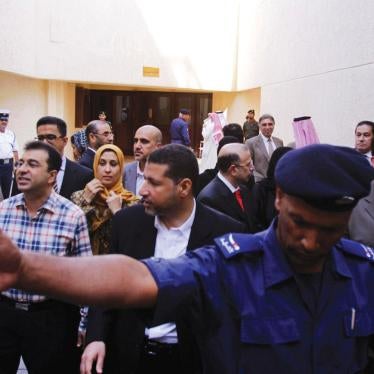(Beirut) – Bahraini authorities should free Abdulhadi al-Khawaja and 13 other jailed leaders of last year’s anti-government protests immediately, Human Rights Watch said today. More than a year after they were arrested, the Bahraini authorities have produced no evidence that the jailed leaders were doing anything but exercising their basic human rights.
A special military court convicted the 14 protest leaders, along with seven others tried in absentia, of offenses related to peaceful political activities – speeches they made, meetings they attended, documents found on their computers, as well as calling for and participating in street protests between February 14 and March 15, 2011. The trial also violated numerous international fair trial standards and relied on apparently coerced confessions. Al-Khawaja and seven others were sentenced to life in prison; the others were sentenced to between 2 and 15 years.
Al-Khawaja has been on a hunger strike since February 8, 2012, demanding freedom for himself and his co-defendants.
“The military court’s original verdict was absolutely mind-boggling – it did not mention a single actual criminal offense beyond acts relating to their basic human rights,” said Joe Stork, deputy Middle East director at Human Rights Watch. “Abdulhadi al-Khawaja and his co-defendants should not have to spend even one more day in prison for so-called crimes of speech and peaceful assembly.”
On April 13, 2012, four United Nations human rights experts – the special rapporteurs on human rights defenders, on independence of judges and lawyers, on torture, and on freedom of assembly and association – called on Bahraini authorities to immediately release al-Khawaja.
A military appeals court confirmed the convictions and sentences on September 29, 2011. On April 30 the Court of Cassation, Bahrain’s highest court, referred the case to the civilian criminal appeals court for retrial, which Bahraini lawyers told Human Rights Watch would probably take many months. The Court of Cassation made no reference, however, to the fact that the defendants had merely been exercising their basic human rights.
Between April and October 2011, special military courts, called National Safety Courts, convicted hundreds of Bahrainis caught up in the “national safety” dragnet that began in mid-March. In a report published on February 28, Human Rights Watch documented extensive and serious fair trial violations in the special military courts as well as in key security-related trials before civilian courts. The report also documented the extensive use of politically motivated charges that violated the rights to free expression and association, and it documented the torture and ill-treatment of detainees.
One of the co-defendants, Ibrahim Sharif, is leader of the National Democratic Action Society, an opposition party that brought together Sunnis and Shia to protest for democratic reforms. Sharif, himself a Sunni, was sentenced to five years for what the trial verdict said was meeting with co-defendants “to discuss the demand for a republic,” for participating in meetings at “unlicensed demonstrations,” and for asserting that “the system of government had lost its legitimacy.”
The Bahrain Independent Commission of Inquiry (BICI), appointed by King Hamad bin Isa Al Khalifain June 2011 and consisting of five international human rights experts, issued its 489-page report on November 23. It confirmed systematic and egregious rights violations by the government in suppressing protests and concluded that a lack of accountability had led to a “culture of impunity.” The commissioners called for judicial review of military court verdicts and said that the government should void convictions of people convicted for peacefully exercising internationally recognized rights of freedom of expression and assembly, and release them.
Human Rights Watch called on Bahraini authorities also to drop all charges against the seven co-defendants not in custody and tried in absentia, for the same reasons.







